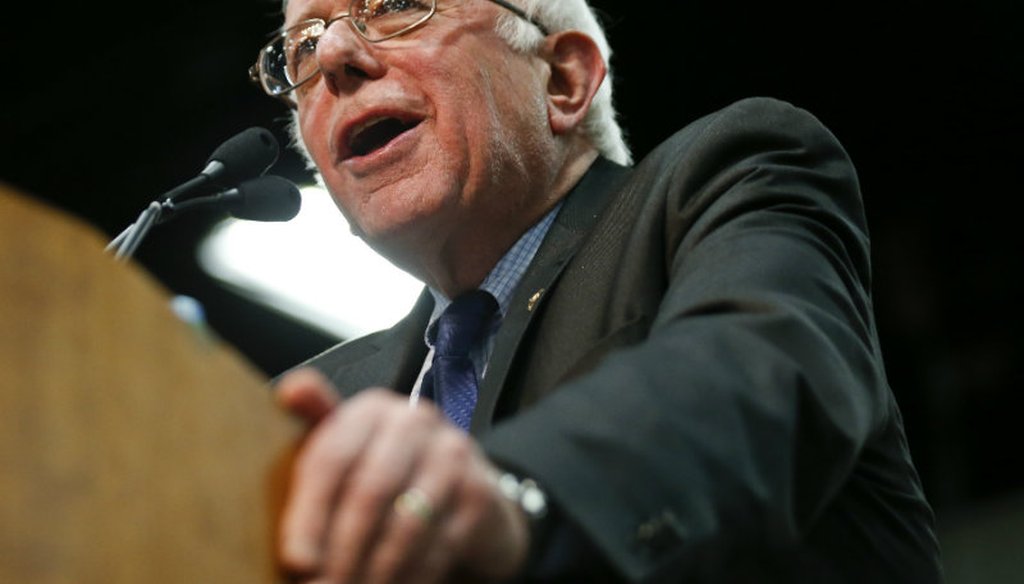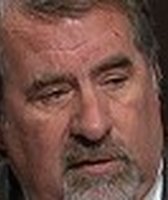Get PolitiFact in your inbox.

Vermont Sen. Bernie Sanders speaks at his presidential campaign rally in San Diego on March 22, 2016.
Vermont Sen. Bernie Sanders added his star power to California’s Yes on 61 ballot campaign this month, appearing in TV ads across the state urging voters to support the November initiative to lower prescription drug prices.
In his trademark populist-style, Sanders calls on Californians to "stand up" to the greed of Big Pharma, as people who can’t afford their medicine are dying "just so these companies can make outrageous profits."
Sanders describes the measure as not just the right moral approach, but also a fiscal benefit, one that could "reverberate all over America."
"Proposition 61 is a very, very important step forward. It will be great for the taxpayers of California," Sanders says in the 30 second ad.
In the video ad above, Bernie Sanders says a prescription drug measure on California's November ballot 'is great for taxpayers.'
Prop 61, also called the California Drug Price Relief Act, would prohibit the state from paying more for prescription drugs than the lowest price paid by the U.S. Department of Veterans Affairs for the same drug. The state would have to negotiate for the lower prices, as the measure does not compel drug companies to automatically reduce charges.
The VA historically pays far less for drugs than most government agencies.
It makes sense for Sanders to bring up taxpayer cost: California spent $3.8 billion on prescription drugs in the 2014-15 fiscal year for state employees, retirees and prison inmates. Prop 61 would impact the price the state spends for drugs on these groups, but would not directly apply to drug costs for the general public.
For now, we won’t rate Sanders’ ‘great for the taxpayers’ claim on the Truth-O-Meter. That’s because it’s a prediction -- PolitiFact doesn’t rate opinions or predictions. It could be months or years before anyone can assess the true effect of Prop 61, if it passes.
This is not the first time Sanders has been featured in a Yes on 61 advertisement. In August, the campaign featured a video clip of Sanders supporting the measure during a Democratic primary speech in California. Sanders’ name is also featured on billboards around the state that read "Bernie says Yes on 61 For Lower Drug Prices."
Still, we wondered what the facts are now: What have independent analysts said about Prop 61 and how it would affect California taxpayers? The answer to the taxpayer question is hard to come by.
Uncertain savings
Reports on Prop 61 by two government agencies gave us pause.
The state’s nonpartisan Legislative Analyst’s Office and CalPERS, which manages retirement funds for state workers and retirees and offers health plans, said they were unable to quantify the potential savings or costs of Prop 61 due to the measure’s many uncertainties.
Both point out the following if Prop 61 passes:
-
Drug manufactures might raise VA drug prices, reducing potential state savings; (Prop 61 supporters argue this would not happen because VA drug discounts are guaranteed under federal law).
-
Drug manufacturers might decline to offer the lower VA prices to the state -- nothing in the measure requires the companies to offer drugs to California at the same price they sell to the VA; the onus is on the state to negotiate for lower prices.
The No on 61 campaign has seized on the first point. It paid for a TV ad featuring veterans who say the initiative will increase the VA’s costs which, in turn, will result in higher prescription drug costs for veterans across the country. The VA has expressed similar concerns.
The No on 61 campaign paid for the advertisement above featuring veterans who say the measure could drive up drug costs.
Also, in its report CalPERS says the price cap imposed by Prop 61 could limit what the state can legally buy and could lead to "decreased access to certain drugs" for its members.
Finding out exactly what the VA pays for some drugs presents another complication. As the LAO points out, the VA keeps some cost information confidential. It’s unknown whether the state could compel a federal agency to disclose those prices.
Despite the uncertainties, there’s potential for Prop 61 to produce significant savings.
"The fiscal impact of this measure is unknown. It could range from relatively little effect to significant annual savings." the LAO wrote in its June analysis. "If the measure lowered total state prescription drug spending by even a few percent, it would result in state savings in the high tens of millions of dollars annually."
‘Basic math’
Sanders’ campaign referred us to Yes on 61.
Roger Salazar, a spokesman for the Yes campaign, said Sanders used "basic math" to make his "great for taxpayers" claim.
Salazar said the VA gets a 24 percent discount on prescription drugs. If California gets the same discount, that could reduce the state’s annual spending on prescription drugs by "nearly $1 billion," the spokesman added.
Opponents, consisting largely of pharmaceutical companies, had raised nearly $87 million to defeat the measure as of this week. Supporters had contributed about $14.5 million, making the campaign the priciest among California’s 17 ballot measure campaigns.
‘Disaster for drug industry’
Salazar says a warning on a blog for pharmaceutical executives makes it clear Big Pharma believes Prop 61 will cut into its profits.
The blog was published in December 2015 on PharmExec.com, and written by Tom Norton, who describes himself as a healthcare executive:
"If the voters of California approve this proposition it would establish an incredibly deep, mandatory discount – in essence a "price control" -- for the public purchase of prescription drugs in America’s largest state. Such an action would no doubt cause an immediate demand for the same VA discount rate to be made available to other states, the federal government, and likely private entities, as well. In short, adoption of VA pricing by the State of California would be a pricing disaster for the entire U.S. drug industry."
The effect of Prop 61 may not be known for years. Opponents, and even some independent analysts, say it will be a difficult measure to implement and could lead to higher drug costs and reduced access to some prescriptions in California.
But supporters in the state, and others such as Sanders, are optimistic the measure will begin to ratchet down sky-high drug prices, easing the burden on taxpayers everywhere.
We can’t rate Sanders’ claim right now. Only time will tell if he’s backing the right prescription for California’s high drug costs.
Our Sources
Bernie Sanders, Yes on 61 advertisement, accessed October 2016
Interview, Kathy Fairbanks, spokeswoman for No on 61, Oct. 10, 2016
Interview, Roger Salazar, spokesman for Yes on 61, Oct. 10, 2016
Legislative Analyst’s Office, Proposition 61 analysis, accessed October 2016
CalPERS, Pension and Health Benefits Committee, Drug Price Relief Act report, accessed October 2016
Yes on 61, The Road to Lower Priced Rx advertisement, accessed October 2016
PharmExec.com, "Ground Zero" for American Rx Price Controls: California, Dec. 16, 2015
Los Angeles Times, Bernie Sanders stars in latest ad supporting drug pricing ballot measure, Oct. 4, 2016
The Mercury News, Ad watch: Will Proposition 61 hurt veterans?, Oct. 7, 2016




















































